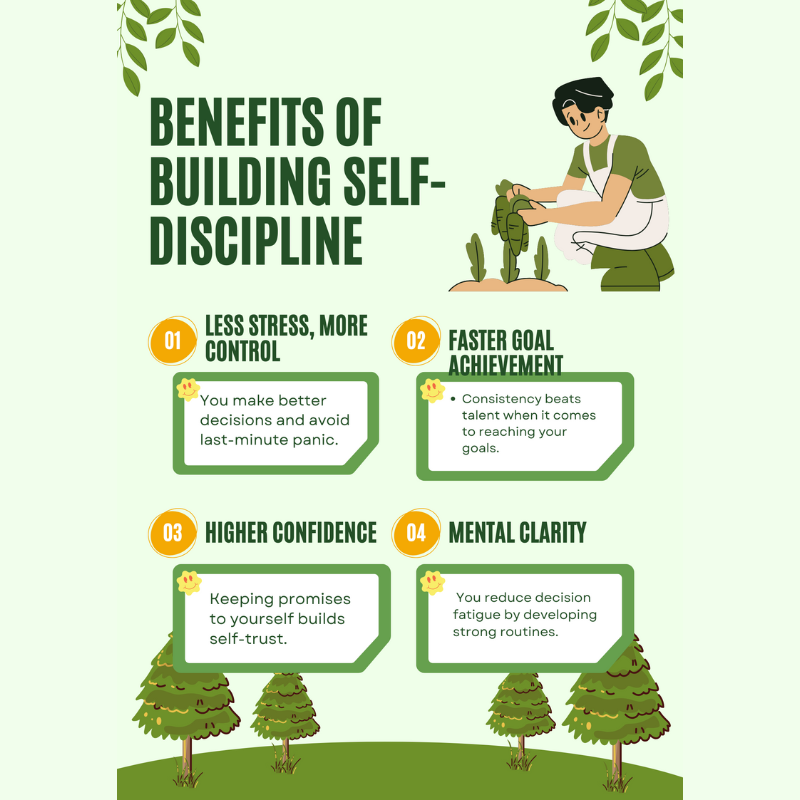In a world full of distractions and instant gratification, building self-discipline and staying consistent can feel like a superpower. Yet, this skill isn’t reserved for high achievers alone; it’s something anyone can cultivate with the right mindset, structure, and daily habits. Whether you’re trying to wake up earlier, stick to a fitness plan, or grow your business, discipline is the key that unlocks your long-term success.
What Is Self-Discipline and Why It Matters in 2025
Self-discipline is the ability to control your impulses, stay focused on long-term goals, and act in alignment with your values even when it’s hard. It’s not about being rigid or perfect. It’s about making conscious choices every day that bring you closer to what matters most.
Clean eating in today’s digital age, where attention spans are shrinking and dopamine hits are just a click away, has become more than just a health trend; it’s a symbol of intentional living. Alongside it, discipline has become more essential than ever. It separates people who consume from those who create, and those who dream from those who do.
Benefits of Building Self-Discipline

Building self-discipline pays off in nearly every area of life. Here’s how:
- Less Stress, More Control: You make better decisions and avoid last-minute panic.
- Faster Goal Achievement: Consistency beats talent when it comes to reaching your goals.
- Higher Confidence: Keeping promises to yourself builds self-trust.
- Mental Clarity: You reduce decision fatigue by developing strong routines.
- Greater Resilience: You learn to push through discomfort and keep going.
Neuroscience Behind Self-Control and Consistency
Science confirms that discipline is a trainable skill:
- Prefrontal Cortex: The area of your brain responsible for planning and decision-making. Training discipline strengthens this region.
- Dopamine Regulation: When you delay gratification and still act, you rewire your brain’s reward system.
- Neuroplasticity: Repeated actions and choices literally reshape your brain’s pathways, making discipline easier over time.
10 Proven Ways to Build Self-Discipline and Stay Consistent
1. Write Down Your Goals
Be specific. A vague goal like “get healthy” lacks clarity. Instead, write: “Work out 4 times a week and meal prep every Sunday.”
2. Practice Prioritizing
Learn to say “no” to the things that don’t align with your goals even when they seem urgent. Discipline is about choosing what matters most over what feels easy.
3. Know and Manage Your Triggers
Understand what leads you to break your habits. Is it boredom, stress, or fatigue? Once you know, plan for them in advance.
4. Build Accountability Systems
Tell someone your goal. Use habit-tracking apps, weekly check-ins, or even public declarations to stay on course.
5. Change Your Self-Talk
Replace “I can’t do this” with “This is hard, but I’m capable.” Your mindset shapes your consistency.
6. Be Mindful of Urges and Impulses
Pause before reacting. Use the 5-minute rule: wait five minutes before acting on an impulse. Often, the urge passes.
7. Use Habit Stacking
Attach a new habit to an existing one. Example: “After I brush my teeth, I’ll meditate for 2 minutes.”
8. Create Backup Plans
Life happens. Have a Plan B: if you can’t go to the gym, do a 10-minute home workout.
9. Track Progress and Celebrate Wins
Small victories compound over time. A visual tracker (like a habit calendar) keeps you motivated.
10. Forgive Yourself and Keep Going
Discipline doesn’t mean never slipping. What matters is bouncing back, not beating yourself up.
Common Challenges to Self-Discipline and How to Beat Them
Fear of Failure
Reframe failure as feedback. Each mistake teaches you how to improve your systems.
Instant Gratification Trap
Use delayed rewards. Tell yourself: “If I finish this task, I’ll enjoy my favorite show later.”
Perfectionism
Done is better than perfect. Progress fuels momentum, not paralysis.
Decision Fatigue
Simplify. Meal plan, wear the same work outfit, or create a fixed morning routine.
Real-Life Examples of Self-Discipline in Action
- Athletes: Training daily, even on low-energy days, builds performance.
- Students: Studying an hour a day consistently outpaces last-minute cramming.
- Entrepreneurs: Showing up online or to meetings even without immediate results builds trust and authority.
Self-Discipline Quotes and Affirmations
“Discipline is choosing between what you want now and what you want most.” Abraham Lincoln
“We must all suffer one of two things: the pain of discipline or the pain of regret.” Jim Rohn
Daily Affirmations:
- “I follow through on what I say I will do.”
- “Every day, I get better at being consistent.”
- “My habits create my success.”
Final Thoughts: Building Consistency Is a Daily Practice
You don’t need to overhaul your entire life to build self-discipline. Start small. Be kind to yourself. Track your progress. Surround yourself with support. Remember, consistency is not about never missing it’s about always returning.
Discipline isn’t about being perfect. It’s about being committed even when it’s hard, even when it’s boring, and especially when you don’t feel like it.
FAQs How to Build Self-Discipline and Stay Consistent
1. What is the best way to build self-discipline?
Start with small, manageable goals and stick to them daily. Use systems like habit tracking, accountability, and mindful routines.
2. How can I stay consistent with my goals?
Break big goals into tiny daily habits, and reward yourself for sticking to them. Set reminders, track progress, and remove distractions.
3. Why do I struggle with self-discipline?
Often, it’s due to unclear goals, lack of motivation, or triggers like stress. Identify your patterns and set up guardrails to help yourself.
4. Can self-discipline be learned or is it innate?
It can absolutely be learned. Like a muscle, it gets stronger the more you use it consistently.
5. What habits help improve consistency?
Morning routines, time blocking, goal-setting, and reflection journaling all help maintain consistency over time.

